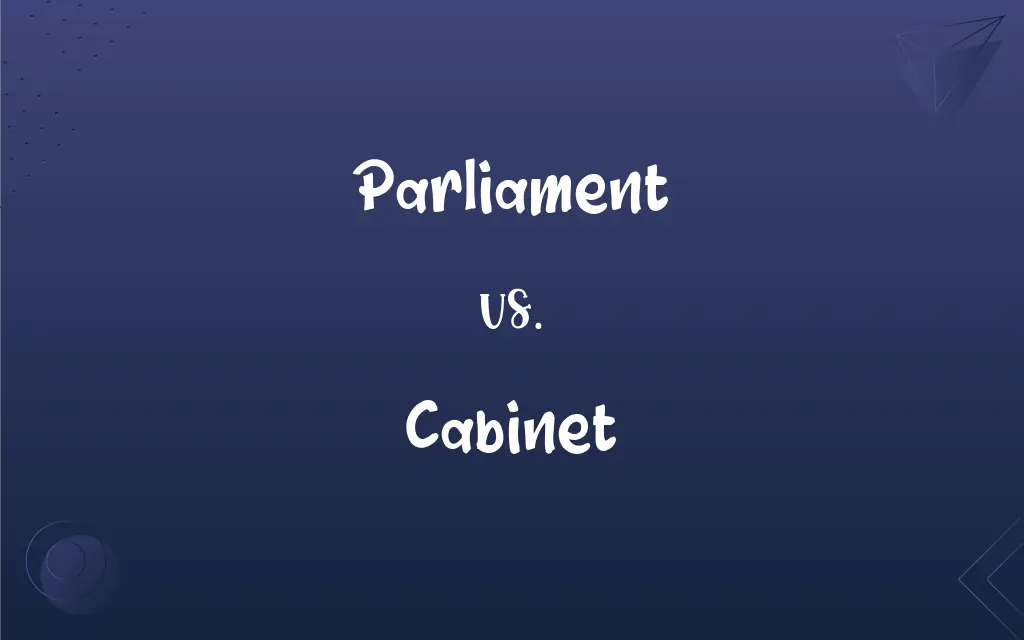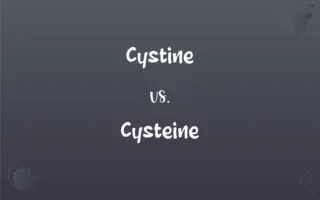Parliament vs. Cabinet: What's the Difference?
Edited by Janet White || By Harlon Moss || Updated on October 3, 2023
Parliament is a legislative body that makes laws, while the cabinet is a group of senior government officials, typically ministers, chosen by the head of state or prime minister.

Key Differences
Parliament is a representative body, often bicameral, where elected members debate and pass laws. In contrast, the cabinet comprises senior government officials who are responsible for specific governmental departments.
Members of parliament (MPs) are typically chosen by the public in democratic elections. The cabinet, on the other hand, is usually appointed by the prime minister or president and is responsible for implementing and formulating policy decisions.
Parliament exercises oversight on the executive branch, including the cabinet, holding them accountable for their decisions and actions. The cabinet, while it might propose or suggest legislation, needs the approval of parliament to enact most laws.
Decisions in parliament are made collectively, with representatives from various political parties contributing to discussions and voting on laws. Cabinet decisions, however, are typically made within the ruling party or coalition, focusing on executive policy-making and administration.
While both parliament and cabinet play crucial roles in governance, their functions are distinct. Parliament is primarily legislative and supervisory, while the cabinet is executive and administrative.
ADVERTISEMENT
Comparison Chart
Composition
Elected members
Appointed senior government officials
Primary Role
Law-making
Policy-making and administration
Accountability
To the electorate
To the parliament and head of state/prime minister
Decision-making
Collectively, with members from various parties
Typically within the ruling party or coalition
Origin
Derived from democratic elections
Chosen by the head of state or prime minister
ADVERTISEMENT
Parliament and Cabinet Definitions
Parliament
A place where political discussions and decisions occur.
Protests were held outside the parliament building.
Cabinet
A group of senior government officials leading departments.
The president announced his new cabinet yesterday.
Parliament
A legislative assembly in certain countries.
The parliament passed the bill unanimously.
Cabinet
Can propose legislation to the parliament.
The cabinet proposed a bill to reform the healthcare system.
Parliament
A body of representatives who make laws.
The budget will be presented to the parliament next week.
Cabinet
Advisors to the head of state or prime minister.
The cabinet met to discuss the economic crisis.
Parliament
Often a bicameral institution with elected members.
The lower house of the parliament debated the proposal for hours.
Cabinet
Typically consists of ministers with specific portfolios.
The health minister updated the cabinet on the pandemic situation.
Parliament
An entity holding the government accountable.
The opposition in the parliament demanded answers from the prime minister.
Cabinet
Involved in policy-making and administration.
The cabinet approved the new policy on education.
Parliament
A representative body having supreme legislative powers within a state or multinational organization.
Cabinet
An upright, cupboardlike repository with shelves, drawers, or compartments for the safekeeping or display of objects.
Parliament
Parliament The national legislature of the United Kingdom, made up of the House of Lords and the House of Commons.
Cabinet
(Computers) The box that houses the main components of a computer, such as the central processing unit, disk drives, and expansion slots.
Parliament
A formal council summoned (especially by a monarch) to discuss important issues.
Cabinet
Often Cabinet A body of persons appointed by a head of state or a prime minister to head the executive departments of the government and to act as official advisers.
Parliament
In many countries, the legislative branch of government, a deliberative assembly or set of assemblies whose elected or appointed members meet to debate the major political issues of the day, make, amend, and repeal laws, authorize the executive branch of government to spend money, and in some cases exercise judicial powers; a legislature.
FAQs
Which body represents the people directly?
Parliament, as its members are usually directly elected by the people.
How are cabinet members chosen?
Cabinet members are typically appointed by the head of state or prime minister.
Do cabinet members belong to parliament?
In many systems, yes, cabinet members are often members of parliament.
Can someone be a member of both the parliament and cabinet?
In many parliamentary systems, yes, a member of parliament can also be a cabinet minister.
Can the cabinet introduce new taxes?
While the cabinet can propose new taxes, they typically need the approval of parliament to be enacted.
Are cabinet meetings public?
Typically, cabinet meetings are private, but decisions or summaries might be made public.
Who selects the topics for cabinet discussions?
The head of the cabinet, usually the prime minister or president, often sets the agenda.
Can parliament override cabinet decisions?
Parliament can exercise oversight and potentially overturn some decisions or policies.
How are laws passed in parliament?
Laws are proposed as bills, debated, possibly amended, and then voted on in parliament.
How are conflicts between parliament and cabinet resolved?
Through negotiations, political processes, or in some cases, intervention by the head of state.
Who has the final say on national budget approval, parliament or cabinet?
Parliament typically has the final say on budgetary matters.
Is parliament responsible for executing laws?
No, parliament makes laws; the cabinet, as part of the executive branch, executes them.
How often does parliament meet?
It varies by country, but parliament typically has regular sessions throughout the year.
Is the cabinet's role the same in all countries?
The role can vary based on the specific governmental system and constitution of a country.
What happens if parliament doesn't approve a cabinet proposal?
The proposal may be amended, withdrawn, or could lead to political consequences.
Who can dissolve parliament?
Often, the head of state can dissolve parliament, sometimes on the advice of the prime minister.
Can members of the public attend parliamentary sessions?
In many democracies, public galleries allow citizens to watch parliamentary proceedings.
What is a shadow cabinet?
A shadow cabinet is a group from the opposition party, mirroring and critiquing the official cabinet's roles.
Who heads the cabinet?
Typically, the prime minister or president heads the cabinet.
How long is a parliamentary term?
It varies by country, but often ranges from 4 to 5 years.
About Author
Written by
Harlon MossHarlon is a seasoned quality moderator and accomplished content writer for Difference Wiki. An alumnus of the prestigious University of California, he earned his degree in Computer Science. Leveraging his academic background, Harlon brings a meticulous and informed perspective to his work, ensuring content accuracy and excellence.
Edited by
Janet WhiteJanet White has been an esteemed writer and blogger for Difference Wiki. Holding a Master's degree in Science and Medical Journalism from the prestigious Boston University, she has consistently demonstrated her expertise and passion for her field. When she's not immersed in her work, Janet relishes her time exercising, delving into a good book, and cherishing moments with friends and family.































































